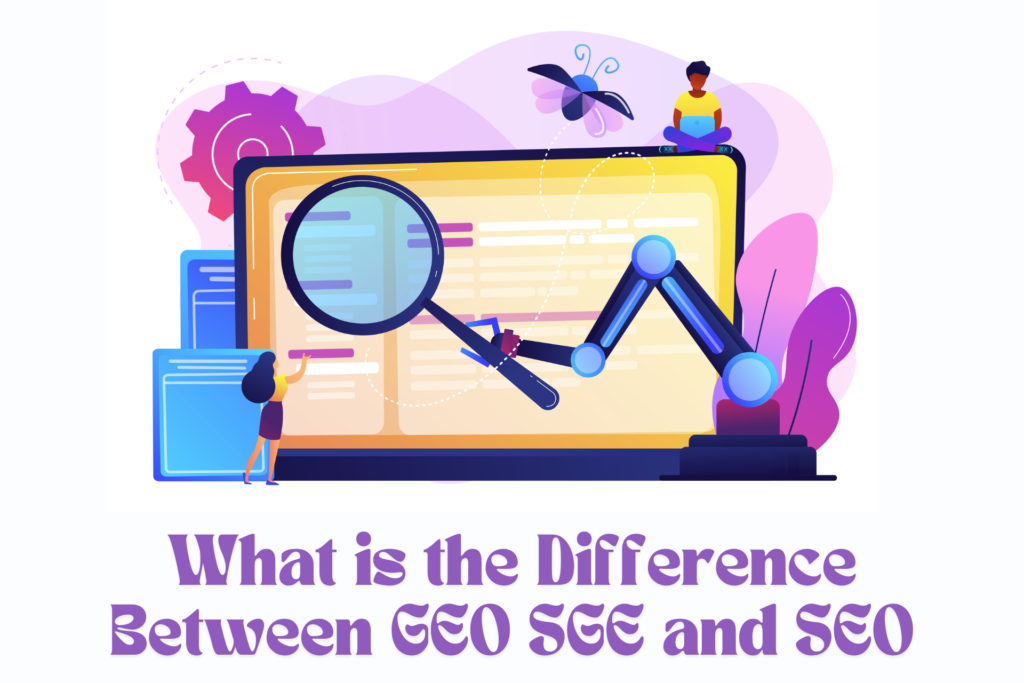Generative Engine Optimization (GEO) is concerned with improving AI-generated content; Search Generative Experience (SGE) is concerned with the enhancement of user search interactions by means of AI-generated dynamic responses; and Search Engine Optimization is a traditional optimization technique that enhances the visibility of a website in search engine results, involving keyword research and content optimization. Each of these strategies is addressing a separate aspect of the digital marketing and user engagement field.
In this article we will talk about ‘What is the Difference Between GEO SGE and SEO‘

GEO, SGE, and SEO for Beginners
Generative Engine Optimization (GEO) seeks to optimize AI-generated content in terms of relevancy and engagement. Search Generative Experience (SGE) uses AI to provide personalized and dynamic search results. Search Engine Optimization (SEO) basically means improving a site for higher visibility through keyword research and technical and Content improvements, together giving new dimensions to modern digital marketing strategies and user engagement.
What is Generative Engine Optimization (GEO)?
Generative Engine Optimization (GEO) is a revolutionary approach whereby content created by generative AI systems is optimized for AI-created content rather than for search engine algorithms, as in traditional SEO. GEO, therefore, optimizes AI-generated content that an human user will think is fitting, relevant, engaging, and satisfying intent, which in turn allows comprehensive tuning of generative models so that they produce high-quality and contextually appropriate content addressing the needs and preferences of target audiences. Given that with advancing capabilities in content creation by hyperintelligent systems, GEO is expected to become a very important aspect of content that really works regarding user engagement and good rankings in some search engine results.

What is Search Generative Experience (SGE)?
A new idea that applies generative AI technologies to the search experience for more dynamic, interactive, and personal search results. Search Generative Experience is a kind of AI knows that it should produce customizable answers; search engines usually make their indexes of web content static. Instead, it provides a type of answering, generally based on the total context and nuances of user queries. This type of question answering can include multiple source summary outputs, original answer creation, and multimedia generation. SGE aims to enhance the user experience by delivering results that are more relevant and comprehensive than what has been previously offered, stripping away simple keyword placement to make search interactions rather more intuitive and satisfying.
What is Search Engine Optimization (SEO)?
SEO is mainly the practice of enhancing one’s website and its content with the aim of enhancing its ranks in SERPs. Various strategies for SEO include keyword optimization, on-page optimization, link building, and technical SEO. It is the act of channeling organic traffic to a site by fetching it from the search engines like Google, Bing, and Yahoo! to their highlighted web pages, and it is such the basis for all digital marketing strategies. Optimizations in SEO burst forth from the underlying algorithms by which search engines work and user behavior maintains the site with content matching not only the technical requirements but also the user expectations.
Key Differences of GEO, SGE, and SEO
It is very important to note the major differences between Generative Engine Optimization (GEO), Search Generative Experience (SGE), and Search Engine Optimization (SEO) so as to harness their opportunities uniquely. GEO deals with optimizing AI-generated content, SGE deals with revolutionizing the user search experience by means of AI-generated results, while SEO remains that ancient practice of getting website rankings improved using established search engine algorithms.
Generative Engine Optimization (GEO):
- Objective: Optimize AI-generated content for relevance and engagement.
- Method: Training generative models to produce high-quality content.
- Application: Content creation, AI content refinement, user intent alignment.

Search Generative Experience (SGE):
- Objective: Enhance search experiences with AI-generated responses.
- Method: Integrating generative AI into search engines to create dynamic results.
- Application: Personalized search results, interactive content, context-aware answers.
Search Engine Optimization (SEO):
- Objective: Improve website visibility in search engine results.
- Method: Employ strategies like keyword optimization, backlink building, and technical SEO.
- Application: Website optimization, organic traffic growth, search engine ranking improvement.
Differences of GEO, SGE, and SEO In Chart
| Feature | GEO (Generative Engine Optimization) | SGE (Search Generative Experience) | SEO (Search Engine Optimization) |
|---|---|---|---|
| Primary Focus | AI-generated content optimization | AI-enhanced search experience | Website ranking improvement |
| Objective | Relevance and engagement of AI content | Personalized and interactive search | Higher visibility in search engines |
| Key Methods | Training generative models | Integrating generative AI in search | Keyword research, on-page, and off-page optimization |
| Main Application | Content creation and refinement | Dynamic and context-aware search results | Website and content optimization |
| Target Users | Content creators, marketers | Search engine users, AI developers | Website owners, digital marketers |
| Technology | Generative AI models | Generative AI in search engines | Search engine algorithms |
Benefits of GEO, SGE, and SEO
Each of these approaches offers distinct benefits, catering to different aspects of digital marketing and user experience.
Benefits of Generative Engine Optimization (GEO):
- Enhanced Content Quality: GEO ensures AI-generated content is of high quality and relevant to user needs.
- Efficiency in Content Creation: Streamlines the content creation process by utilizing AI capabilities.
- Personalization: Produces content tailored to specific audience preferences and intents.
Benefits of Search Generative Experience (SGE):
- Improved User Engagement: Provides more dynamic and interactive search results, enhancing user satisfaction.
- Comprehensive Answers: Offers synthesized information from multiple sources, delivering thorough and contextually appropriate answers.
- Personalized Search Experience: Tailors search results to individual user queries and preferences.
Benefits of Search Engine Optimization (SEO):
- Increased Organic Traffic: Effective SEO strategies lead to higher search engine rankings and more organic visitors.
- Cost-Effective Marketing: Provides a cost-effective way to attract users compared to paid advertising.
- Long-Term Results: Good SEO practices build a strong foundation for sustained online visibility and traffic growth.
Core Principles and Best Practices of GEO, SGE, and SEO
Understanding the core principles and best practices of Generative Engine Optimization (GEO), Search Generative Experience (SGE), and Search Engine Optimization (SEO) is crucial for effectively implementing these strategies to enhance digital presence and user engagement.
Generative Engine Optimization (GEO)
Core Principles:
- AI-Generated Content Quality: Focus on producing high-quality, relevant content using AI-generated systems.
- User Intent Alignment: Ensure that AI-generated content aligns with user search intent and preferences.
- Continuous Optimization: Regularly refine and optimize AI-generated content based on performance metrics and user feedback.
Best Practices:
- Data-driven Approach: Utilize data analytics to understand audience preferences and behaviors for better content creation.
- AI Training and Tuning: Train AI models effectively to generate content that resonates with target audiences.
- Human Oversight: Combine AI capabilities with human oversight to maintain content accuracy and authenticity.
- Ethical Considerations: Adhere to ethical standards in AI use, ensuring content quality and user trust.
Search Generative Experience (SGE)
Core Principles:
- Personalization: Enhance user experience by delivering personalized and contextually relevant search results.
- Dynamic Responses: Use AI to provide real-time and interactive search responses, including multimedia content.
- User-Centric Design: Design search interfaces that prioritize user satisfaction and ease of use.
Best Practices:
- Natural Language Processing (NLP): Implement NLP technologies to understand and respond to natural language queries effectively.
- Multimedia Integration: Incorporate images, videos, and other multimedia elements to enrich search results and enhance user engagement.
- Real-Time Updates: Provide timely updates and information relevant to user queries to improve search experience.
- Accessibility and Responsiveness: Ensure search interfaces are accessible across devices and responsive to user interactions.
Search Engine Optimization (SEO)
Core Principles:
- Keyword Optimization: Conduct thorough keyword research and integrate relevant keywords naturally into content.
- Technical SEO: Optimize website structure, speed, and mobile-friendliness to improve user experience and search engine crawlability.
- Content Quality: Publish high-quality, valuable content that addresses user queries and provides informative answers.
Best Practices:
- On-Page Optimization: Optimize meta tags, headings, and content structure to enhance visibility and relevance.
- Off-Page SEO: Build high-quality backlinks from reputable websites to improve domain authority and search rankings.
- Local SEO: Optimize business listings and citations to improve visibility in local search results.
- Analytics and Monitoring: Use analytics tools to track performance metrics, analyze user behavior, and adjust SEO strategies accordingly.
Each strategy brings unique advantages and contributes to creating a robust online presence most suitable to meet the constant changes insisted by modern users and search technologies. By following these simple principles and best practices, companies can get the most out of their Generative Engine Optimization (GEO), Search Generative Experience (SGE), and Search Engine Optimization (SEO) in terms of online visibility, user engagement, and digital marketing effectiveness.
Advantages of SGE in Today’s Digital Landscape
Several advances that are changing the fashion in which users interact with search engines are being wrought into the digital landscape by the SGE. One of the first impacts meant here is that it can fully engage the user through dynamic and interactive search results. SGE uses AI to create answers that are relevant and rich in context by supplying information that guarantees comprehensive and nuanced answers to user queries. By giving a personalized search experience based on user preferences and behavior, it will facilitate the growth of higher satisfaction and retention rates.
Аlso, the ability to synthesize information from multiple sources guarantees that users get contextualized and well-rounded information while little searching shall not be missed. As time itself is becoming so sensitive nowadays, this returns huge dividends. Besides, the integration of multimedia content such as images and videos into text responses fits diversified preferences for consuming content, thereby making search experiences more enriching and immersive.
The Role of SEO in Digital Marketing Strategies
SEO has become a buzzword in modern-day digital marketing. This is because it helps to enhance the online presence of a website along the lines of the relevant searching engine results pages for the purpose of drawing organic traffic to the websites. Through keyword analysis, on-site SEO, link construction, and improvement of other technical components of websites, SEO can help target its audience better. Integrating the content with the queries a user has and the patterns of the search engine, SEO makes it possible for businesses to acquire their desired customers and help in keeping those customers.
SEO is important for building up brand authority and credibility also. Often, high-ranking sites are considered more trustworthy and reliable, which can change the way consumers behave. The other work they have is to give insight into the consumer behavior from the analytical ladder of data, which makes it easier for brands to change their marketing strategy and lay the foundation for a better user experience. In the very highly competitive competitive internet marketplace, in which SEO is effective, SEO will help set the brand away from the pack and into the long term growth and profitability game.
Impact of GEO, SGE, and SEO on Search Results
The contribution of GEO, SGE, and SEO to search results is remarkable but distinct in several respects. GEO (Generative Engine Optimization) assists search results by averting AI bots that flood the web with excessive amounts of irrelevant or low-quality AI-generated content as AI-driven results are fast spreading. This optimization assists in protecting the content the users get from deterioration and irrelevance.
SGE also quite forcefully expands the bounds of search results by using AI to generate a wider range and more engaging answers to search prompts than simple text-based hyperlinks. This makes sure that the users received context-rich satisfactorily answers which can contain snippets of text or video presentation. Thus, the application of SGE in search engines allows the users to obtain much more complete and focused results than what they came to look for.
Yet, the perspective role of SEO – ubicomp’s visibility of web pages with regards to their relevance to end search result queries largely Is still important. Users are able to follow a website by employing efficient searches, which raises the chance of users noticing and interacting with it. SEO focuses on the most relevant and authoritative content and makes it as visible as possible to customers, which will drive organic traffic and increase opportunities for monetization of the site.
Choosing the Right Optimization Strategy for Your Business
Selecting the appropriate optimization strategy for your business depends on various factors, including your target audience, business goals, and resources. Each strategy—GEO, SGE, and SEO—offers distinct advantages and can be integrated to maximize results.
- Generative Engine Optimization: If content creation lies at the core of your business and you want to use AI in generating that content, GEO is vital. It determines whether AI-drafted content is engaging, relevant, and addresses the need of the audience. This is specifically useful for businesses focusing on large content marketing activities.
- Search Generative Experience (SGE): Incorporating SGE will work wonders for businesses that want to proactively engage their customers with thoughtful, interactive search experiences. It is a great strategy for companies seeking to fundamentally differentiate themselves from competition by flying under the radar while offering personalized and dynamic content directly on search results.
- Search Engine Optimization (SEO): SEO is important for any type of business that wants its online presence acknowledged and draws organic traffic. A long-term method of establishing credibility, attaining sustained growth, and growing one’s online network. No matter the kind of competitive niche, SEO should be an integral part of your digital marketing strategy so that your content can be easily found in search engines and rank high.
In many instances, a hybrid model incorporating certain aspects of GEO, SGE, and SEO proves most advantageous, offering clients the best of the advantages that each of the options present. By getting an insight into the specific advantages and applications of these optimization techniques, you can customize your strategies to fit the needs of your business and take advantage of opportunities in the digital market that will ensure you stay competitive.
The Role of AI in GEO and SGE
AI (Artificial Intelligence) is very important in GEO (Generative Engine Optimization) and SGE (Search Generative Experience); such a revolution not only identifies a way toward an in-built creative synthesis of content but also the way it gets applied, optimized, and delivered in online settings.
AI in Generative Engine Optimization (GEO):
- Content Creation: AI algorithms are used to generate high-quality, contextually relevant content at scale. This content can range from articles and blog posts to product descriptions and social media updates.
- Optimization: AI analyzes user behavior and engagement metrics to refine and optimize content continuously. It ensures that AI-generated content meets the expectations of both users and search engine algorithms.
- Personalization: AI can tailor content based on user preferences, demographics, and browsing history, enhancing user engagement and satisfaction.
AI in Search Generative Experience (SGE):
- Dynamic Responses: AI powers search engines to deliver dynamic and personalized responses to user queries. This includes summarizing information, generating multimedia content (such as images and videos), and providing real-time updates.
- Context Awareness: AI understands the context of user queries, enabling search engines to offer more relevant and accurate answers. This capability enhances the user experience by anticipating user needs and preferences.
- Natural Language Processing (NLP): AI-driven NLP technologies enable search engines to interpret and respond to natural language queries effectively. This makes interactions more conversational and intuitive for users.
In both GEO and SGE, AI acts as a catalyst for innovation by automating complex tasks, improving efficiency, and enhancing the overall user experience. By leveraging AI capabilities, businesses can stay competitive in the ever-evolving digital landscape and meet the increasing demands for personalized and relevant content and search experiences.
How to Stay Updated with Trends in Search Technologies
Staying updated with trends in search technologies is crucial for businesses and marketers to adapt their strategies effectively and maintain a competitive edge. Here are some effective strategies to stay informed:
- Follow Industry Leaders and Experts:
- Subscribe to blogs, newsletters, and social media accounts of industry leaders, experts, and reputable organizations specializing in SEO, AI, and digital marketing.
- Attend webinars, conferences, and workshops hosted by industry influencers to gain insights into emerging trends and best practices.
- Monitor Industry Publications and Research:
- Regularly read industry publications, such as Search Engine Journal, Moz Blog, and Search Engine Land, to stay informed about the latest developments in search technologies.
- Review research papers and reports published by leading research institutions and technology companies to understand the future direction of AI and search algorithms.
- Engage with Online Communities:
- Join online forums, discussion groups, and LinkedIn groups focused on SEO, AI, and digital marketing.
- Participate in discussions, ask questions, and share knowledge with peers and professionals to exchange insights and stay updated on industry trends.
- Experiment and Test:
- Continuously experiment with new SEO tools, AI-driven platforms, and search engine features to understand their capabilities and potential impact on search rankings and user experience.
- Conduct A/B testing and analyze performance metrics to evaluate the effectiveness of new strategies and technologies.
- Monitor Search Engine Updates:
- Stay informed about algorithm updates and changes announced by major search engines like Google, Bing, and Yahoo.
- Understand how these updates may affect search rankings and adjust SEO strategies accordingly to maintain visibility and performance.
- Invest in Continuous Learning:
- Enroll in online courses, certifications, and workshops offered by educational platforms and industry associations to deepen your understanding of AI, SEO, and search technologies.
- Stay curious and proactive in exploring new ideas and approaches to optimize content and improve search engine performance.
By adopting a proactive approach to learning and staying updated with trends in search technologies, businesses can effectively harness the power of AI and SEO to drive growth, enhance user experiences, and achieve sustainable success in the digital era.
Common Questions About GEO, SGE, and SEO
1. What is Generative Engine Optimization (GEO)?
- Generative Engine Optimization (GEO) refers to stimulating content length concord according to AI systems. GEO is thus to ensure that AI-generated content is relevant, engaging, and aligned with user intent and predilection of search engines.
2. What is Search Generative Experience (SGE)?
- Search Generative Experience (SGE) offers a promising enhancement of search interactions that contextualizes features through applying focused, personalized, and dynamic presenting elements. Through this, it is capable of giving a better user satisfaction with real-time and interactive informative search experiences.
3. What is Search Engine Optimization (SEO)?
- By optimizing a site and its content for visibility and ranking in search engine results pages (SERPs), you have SEO. This can range from keyword research, on-page optimization, and link-building methods.
4. In what way do GEO and SEO differ from one another?
- GEO optimizes for all content concerning AI, while SEO optimizes for human-generated content. GEO will use AI to produce and amend content, with then fulfillment for both user expectations and search engine procedure.
5. What are the advantages of SGE searched engines?
- SGE provides the user with personalized as well as interactive searching of his/her requirement. It enhances the search experience with AI-generated responses through various multimedia elements currently perusing individual user preferences.
6. Why is SEO important for digital marketing strategies?
- Such approaches to drive organic traffic to websites through greater visibility on search engines make SEO play very important roles among other key strategies for businesses in their digital marketing endeavors, since they help in attracting more qualified leads, building credibility, and ultimately digital marketing strategies.
7. How They Can Choose The Right Optimization Strategy (GEO, SGE, or SEO) For Themselves?
- When it comes to selecting the optimization strategies, businesses must weigh its aims, goals, and target audiences, as well as its resources. GEO is perfect for those focusing on AI-generated content, SGE for improvement in the user search experience, and SEO for bringing the best rankings and organic traffic from search engines.
8. What function does AI entail in GEO and SGE?
- AI essentially powers GEO to create, optimize, and deliver high-volume, relevant content for users. Whereas SGE works by modifying the search engine’s dynamics to deliver personalized feedback and increase interaction with end users organic search results.
9. How will businesses keep up with trends in search technologies?
- Staying updated on trends in search technology means businesses follow through with the leaders, read the relevant industry publications, socially engage, keep notes on announced changes in search engines, and experiment with new technology. In addition, they can invest in ongoing professional development, through a plethora of courses and workshops offered by several trusted institutions.
10. How do GEO, SGE, and SEO impact search results differently?
- Where GEO creates and scales AI-driven content that is completely optimized and relevant, SGE engages audiences with more dynamic and personalized responses while SEO will help with the overall online visibility and ranking of websites on SERP.
These answers provide the business with a basic understanding of what GEO, SGE, or SEO is, further leading the business to efficiently navigate through the adjustments that the digital marketing and search technology paradigms encounter in time.







